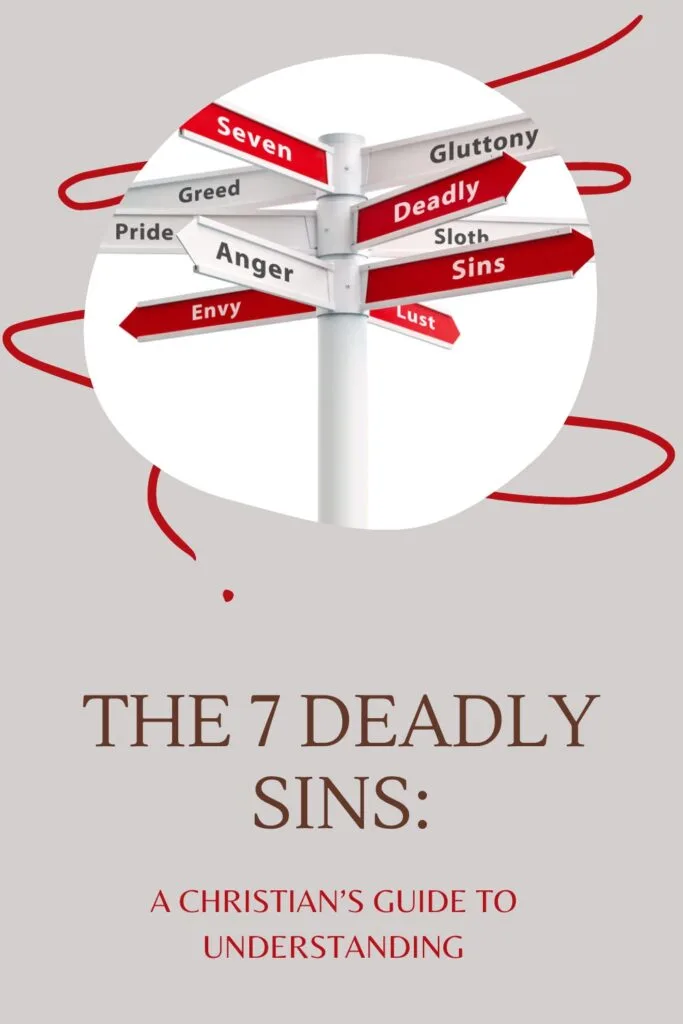This page/post may contain affiliate links. As an Amazon Associate, as well as an affiliate of other programs, this means if you purchase something using these links, I will receive a commission on qualifying purchases at no cost to you! For more detailed information, please visit our Affiliate Disclaimer page
Anybody who has been in or even around Christian culture has likely heard of something called the seven deadly sins. The term is thrown around a lot, but what are they actually? And why are they considered particularly deadly?
The 7 Deadly Sins
First, let’s understand sin. The definition of sin, in the most simple terms, is anything the Lord hates and, therefore, anything that separates us from Him.
The seven deadly sins are pride, greed, lust, envy, gluttony, wrath, and sloth, all of which contradict the Ten Commandments. Also called cardinal sins or capital sins, these 7 transgressions were first listed in the sixth century by Pope Gregory I, also known as St. Gregory, and were then adopted into the catechism of the catholic church. Although these cardinal sins originated in Catholicism, they are a good thing to understand across all Christian denominations.
These particular sins earn the title of deadly sins, cardinal sins, or capital sins because they are a gateway or stepping-stone to other sins and are, therefore, harmful to our spiritual progress as we undergo the sanctification process. In the Catechism of the catholic church, it is said that they lead to spiritual death and eternal damnation. Of course, it is sin without repentance that leads us to eternal damnation, but because of the sacrifice of Jesus, committing these sins as a born-again believer does not result in complete spiritual death. You can still repent from these sins and continue in your spiritual growth.
Now, let’s break down each of the seven deadly sins one by one with applicable scripture.

Pride
Pride is simply defined as an excessive love for self-excellence, particularly one that exceeds a person’s love for others, as laid out in the Ten Commandments. Pride is considered a mortal sin because prioritizing one’s self-excellence above that of others so easily leads the way to more sin, such as a lying tongue, excessive desire for material goods (which is greed), and every other sin on this list.
“One’s pride will bring him low, but he who is lowly in spirit will obtain honor.”
Proverbs 29:23 (ESV)
“Do nothing from selfish ambition or conceit, but in humility count others more significant than yourselves.”
Philippians 2:3 (ESV)
“Let the one who boasts, boast in the Lord.” For it is not the one who commends himself who is approved, but the one whom the Lord commends.”
2 Corinthians 10:17-18 (ESV)
“Haughty eyes and a proud heart, the lamp of the wicked, are sin.”
Proverbs 21:4 (ESV)
Greed
As it was just mentioned, greed is the excessive desire for material goods and material wealth. The presence of greed in a Christian life means that there is a lack of the contentment we are called to in Christ Jesus. We are called to build up spiritual riches in heaven through our good works in this life. This strife for material goods and material wealth means nothing in the eyes of eternity and indicates a lack of trust in the Lord as the great provider.
“Do not lay up for yourselves treasures on earth, where moth and rust destroy and where thieves break in and steal, but lay up for yourselves treasures in heaven, where neither moth nor rust destroys and where thieves do not break in and steal. For where your treasure is, there your heart will be also.”
Matthew 6:19-21 (ESV)
“For the love of money is a root of all kinds of evils. It is through this craving that some have wandered away from the faith and pierced themselves with many pangs.”
1 Timothy 6:10 (ESV)
“Keep your life free from love of money, and be content with what you have, for he has said, “I will never leave you nor forsake you.”
Hebrews 13:5 (ESV)
“And he said to them, “Take care, and be on your guard against all covetousness, for one’s life does not consist in the abundance of his possessions.”
Luke 12:15 (ESV)
Lust
Lust is defined as a strong desire of a sexual nature, and well, it’s obvious why this is one of the seven deadly sins. As followers of Jesus, our body is the temple of the Holy Spirit and should be treated as such. It is human nature to experience sexual desires, but that does not give an excuse to give into it, foster it, or even just let it stay in our bodies/minds/hearts/etc. Lust, of course, is a gateway to sexual immorality, which we are warned against numerous times by the word of the Heavenly Father.
“For this is the will of God, your sanctification: that you abstain from sexual immorality; that each one of you know how to control his own body in holiness and honor, not in the passion of lust like the Gentiles who do not know God.”
1 Thessalonians 4:3-5 (ESV)
“But I say to you that everyone who looks at a woman with lustful intent has already committed adultery with her in his heart.”
Matthew 5:28 (ESV)
“Flee from sexual immorality. Every other sin a person commits is outside the body, but the sexually immoral person sins against his own body.”
1 Corinthians 6:18 (ESV)
Envy
To envy is to covet over, want, or be jealous of somebody else, whether it be their appearance, possessions, lifestyle, or quite literally anything under the sun. This particular one of the seven deadly sins or capital sins ties into greed as both are characterized by discontentment with one’s own life.
In the modern world of technology, specifically social media, that we live in today, overcoming envy can be especially difficult. The material goods and happy faces of others are constantly thrown at us, even if it’s completely fake, and we’re left wondering why we don’t have it as good as them. But God ensures us that He will never leave us without our needs, and that being rich on this earth means absolutely nothing to Him, the only one who’s opinion matters.
“A tranquil heart gives life to the flesh, but envy makes the bones rot.
Proverbs 14:30 (ESV)
“You shall not covet your neighbor’s house; you shall not covet your neighbor’s wife, or his male servant, or his female servant, or his ox, or his donkey, or anything that is your neighbor’s.”
Exodus 20:17 (ESV)
“But godliness with contentment is great gain, for we brought nothing into the world, and we cannot take anything out of the world. But if we have food and clothing, with these we will be content.”
1 Timothy 6:6-8 (ESV)
“But seek first the kingdom of God and his righteousness, and all these things will be added to you.”
Matthew 6:33 (ESV)

Gluttony
Gluttony is synonymous with overconsumption and typically applies to food and drink in the context of the seven deadly sins. This is not saying that getting super full at that buffet that one time was a mortal sin, but rather eating to that point on a regular basis. The mortal sin of gluttony also relates to the idea of treating our bodies as the temple that they are. Over-eating and drinking leads to unhealthy weight that harms our bodies from the inside out and can prevent us from being able to perform every task that may be set out for us as witnesses’ of Jesus’ love to the world.
“Do you not know that you are God’s temple and that God’s Spirit dwells in you? If anyone destroys God’s temple, God will destroy him. For God’s temple is holy, and you are that temple.”
1 Corinthians 3:16-17 (ESV)
“Be not among drunkards or among gluttonous eaters of meat, for the drunkard and the glutton will come to poverty, and slumber will clothe them with rags.”
Proverbs 23:20-21 (ESV)
“So, whether you eat or drink, or whatever you do, do all to the glory of God.”
1 Corinthians 10:31 (ESV)
“I appeal to you therefore, brothers, by the mercies of God, to present your bodies as a living sacrifice, holy and acceptable to God, which is your spiritual worship.”
Romans 12:1 (ESV)
The form you have selected does not exist.
Wrath
Although wrath and anger can be a holy, spiritual work, the wrath among the capital sins is of course not a good thing. This wrath directly contradicts the love we are called to have for others and leads to sinful mistreatment of them when left uncontrolled. Righteous anger stems from love and is of the Holy Spirit, while sinful anger stems from evil and is of the flesh of human nature.
“Whoever is slow to anger has great understanding, but he who has a hasty temper exalts folly.”
Proverbs 14:29 (ESV)
“Know this, my beloved brothers: let every person be quick to hear, slow to speak, slow to anger; for the anger of man does not produce the righteousness of God.”
James 1:19-20 (ESV)
“Be angry and do not sin; do not let the sun go down on your anger, and give no opportunity to the devil.”
Ephesians 4:26-27 (ESV)
“Beloved, never avenge yourselves, but leave it to the wrath of God, for it is written, “Vengeance is mine, I will repay, says the Lord.”
Romans 12:19 (ESV)
Sloth
Sloth, also referred to as laziness, is a direct neglect of the spiritual matters to which we are called in this life. There is a spiritual sloth, which is the neglect of the great commission, and physical laziness, which is the neglect of the work given to us to provide for our families. We are called to provide for our families and make disciples of great nations, and that can not be done on any scale without physical and mental effort. No matter how far out of your comfort zone it is, neglecting God’s calling is a grave sin.
“Whatever you do, work heartily, as for the Lord and not for men.”
Colossians 3:23 (ESV)
“But if anyone does not provide for his relatives, and especially for members of his household, he has denied the faith and is worse than an unbeliever.”
1 Timothy 5:8 (ESV)
“But be doers of the word, and not hearers only, deceiving yourselves.”
James 1:22 (ESV)
“Do not be slothful in zeal, be fervent in spirit, serve the Lord.”
Romans 12:11 (ESV)
Again, the seven deadly sins are thrown around all the time in and around Christian culture, whether they are understood or not. Labeled as the seven deadly sins, cardinal sins, or capital sins, as they are found in the catechism of the catholic church or left unlabeled, it is important to understand what can so easily creep into your life and cause a chain reaction of sin and stunt spiritual growth.
You may enjoy this series by Joyce Meyer on the 7 deadly sins.
Or one of these highly recommended resources on the 7 deadly sins:
Glittering Vices: A New Look at the Seven Deadly Sins and Their Remedies by Rebecca Konyndyk DeYoung
Reimagining the Seven Deadly Sins: Reshaping Our Hearts in a Complex World by James Philipps
ESV – “Scripture quotations are from The ESV® Bible (The Holy Bible, English Standard Version®), copyright © 2001 by Crossway, a publishing ministry of Good News Publishers. Used by permission. All rights reserved.”

